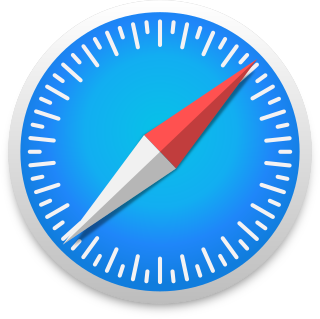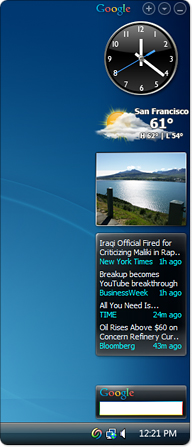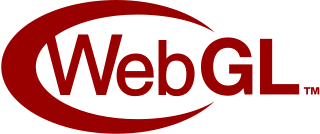Related Research Articles
iCab is a web browser for Mac OS by Alexander Clauss, derived from Crystal Atari Browser (CAB) for Atari TOS compatible computers. It was one of the few browsers still updated for the classic Mac OS prior to that version being discontinued after version 3.0.5 in 2008; Classilla was the last browser that was maintained for that OS but it was discontinued in 2021.

Safari is a web browser developed by Apple. It is built into Apple's operating systems, including macOS, iOS, and iPadOS, and uses Apple's open-source browser engine WebKit, which was derived from KHTML.

Bonjour is Apple's implementation of zero-configuration networking (zeroconf), a group of technologies that includes service discovery, address assignment, and hostname resolution. Bonjour locates devices such as printers, other computers, and the services that those devices offer on a local network using multicast Domain Name System (mDNS) service records.

In computing, the desktop metaphor is an interface metaphor which is a set of unifying concepts used by graphical user interfaces to help users interact more easily with the computer. The desktop metaphor treats the computer monitor as if it is the top of the user's desk, upon which objects such as documents and folders of documents can be placed. A document can be opened into a window, which represents a paper copy of the document placed on the desktop. Small applications called desk accessories are also available, such as a desk calculator or notepad, etc.

Maxthon is a freeware web browser, created by JeffChen in Singapore. It is available for Windows, macOS, Linux, and as Maxthon Mobile for Android, iOS, and Windows Phone 8. Since version 6, Maxthon is based on Chromium.

Google Desktop was a computer program with desktop search capabilities, created by Google for Linux, Apple Mac OS X, and Microsoft Windows systems. It allowed text searches of a user's email messages, computer files, music, photos, chats, Web pages viewed, and the ability to display "Google Gadgets" on the user's desktop in a Sidebar.

Microsoft Internet Explorer 4 (IE4) is the fourth, and by now, discontinued, version of the Internet Explorer graphical web browser that Microsoft unveiled in Spring of 1997, and released on September 22, 1997, primarily for Microsoft Windows, but also with versions available for the classic Mac OS, Solaris, and HP-UX and marketed as "The Web the Way You Want It".
In computing, a keyboard shortcut is a sequence or combination of keystrokes on a computer keyboard which invokes commands in software.
Parallels Desktop for Mac is software providing hardware virtualization for Macintosh computers with Intel processors, and since version 16.5 also for Apple silicon-based Macintosh computers. It is developed by Parallels, since 2018 a subsidiary of Corel.
The usage share of operating systems is the percentage of computing devices that run each operating system (OS) at any particular time. All such figures are necessarily estimates because data about operating system share is difficult to obtain. There are few reliable primary sources and no agreed methodologies for its collection. Operating systems are used in the vast majority of computers, from embedded devices to supercomputers.

A site-specific browser (SSB) is a software application that is dedicated to accessing pages from a single source (site) on a computer network such as the Internet or a private intranet. SSBs typically simplify the more complex functions of a web browser by excluding the menus, toolbars and browser GUI associated with functions that are external to the workings of a single site. These applications are typically started by a desktop icon which is usually a favicon.
Google Chrome is a cross-platform web browser developed by Google. It was first released in 2008 for Microsoft Windows, built with free software components from Apple WebKit and Mozilla Firefox. Versions were later released for Linux, macOS, iOS, and also for Android, where it is the default browser. The browser is also the main component of ChromeOS, where it serves as the platform for web applications.

WebGL is a JavaScript API for rendering interactive 2D and 3D graphics within any compatible web browser without the use of plug-ins. WebGL is fully integrated with other web standards, allowing GPU-accelerated usage of physics, image processing, and effects in the HTML canvas. WebGL elements can be mixed with other HTML elements and composited with other parts of the page or page background.

Red Star OS is a North Korean Linux distribution, with development first starting in 1998 at the Korea Computer Center (KCC). Prior to its release, computers in North Korea typically used Red Hat Linux and later switched to modified versions of Microsoft Windows with North Korean language packs installed.
Pwn2Own is a computer hacking contest held annually at the CanSecWest security conference. First held in April 2007 in Vancouver, the contest is now held twice a year, most recently in March 2023. Contestants are challenged to exploit widely used software and mobile devices with previously unknown vulnerabilities. Winners of the contest receive the device that they exploited and a cash prize. The Pwn2Own contest serves to demonstrate the vulnerability of devices and software in widespread use while also providing a checkpoint on the progress made in security since the previous year.

μTorrent, or uTorrent, is a proprietary adware BitTorrent client owned and developed by Rainberry, Inc. The "μ" in its name comes from the SI prefix "micro-", referring to the program's small memory footprint: the program was designed to use minimal computer resources while offering functionality comparable to larger BitTorrent clients such as Vuze or BitComet. μTorrent became controversial in 2015 when many users unknowingly accepted a default option during installation which also installed a cryptocurrency miner.
Puffin Browser is a remote browser developed by CloudMosa, an American mobile technology company founded by Shioupyn Shen.

ArcaOS is an operating system based on OS/2, developed and marketed by Arca Noae, LLC under license from IBM. It was codenamed Blue Lion during its development. It builds on OS/2 Warp 4.52 by adding support for new hardware, fixing defects and limitations in the operating system, and by including new applications and tools, and includes some Linux/Unix tool compatibility. It is targeted at professional users who need to run their OS/2 applications on new hardware, as well as personal users of OS/2.
Comparison of user features of operating systems refers to a comparison of the general user features of major operating systems in a narrative format. It does not encompass a full exhaustive comparison or description of all technical details of all operating systems. It is a comparison of basic roles and the most prominent features. It also includes the most important features of the operating system's origins, historical development, and role.
References
- ↑ "Working With "My Network Places" in Windows - Stemjar". 2020-09-19. Archived from the original on 2020-09-19. Retrieved 2023-09-04.
- ↑ "Connecting to Another Computer - Mac OS 9: Visual QuickStart Guide [Book]". www.oreilly.com. Retrieved 2023-09-04.